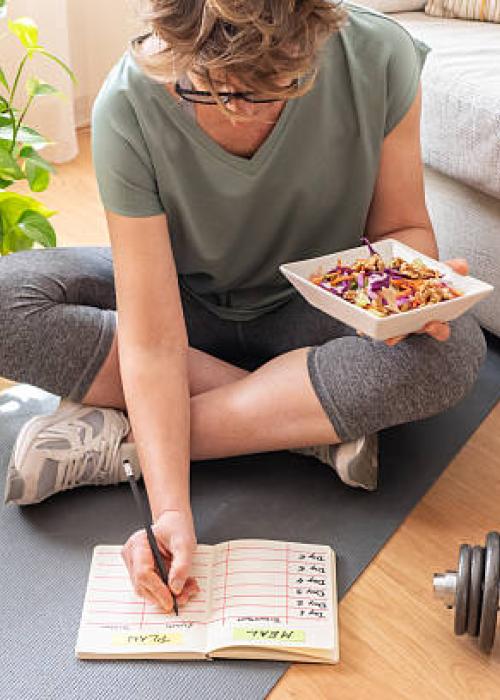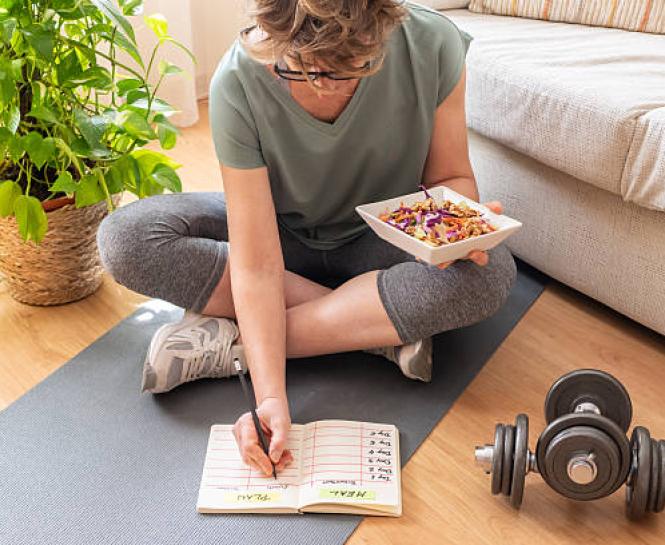If you are starting a new exercise routine or looking to enhance your current routine, you may be curious about what time of day is best to work out.
“What is most important is not the time of the day you work out but that you are taking the time to prioritize your health,” said Jasmin James, DO, Catholic Health Primary Care Physician. “Routine exercise, at least 30 minutes of moderate physical activity each day, has numerous benefits. It helps you maintain a healthy weight, strengthens your muscles and reduces the risk of conditions like heart disease and diabetes.”
She explained that although there is no definitive answer about the best time to work out, choosing the morning, afternoon or evening each has different benefits. “You have to find the best routine for you,” she said. “Factors like your job hours and personal and family obligations may mean you can only work out at a specific time.”
What are the benefits of working out in the morning?
Working out in the morning, especially if you work out on an empty stomach, is the best way to burn stored fat. Research suggests that people who exercise on an empty stomach burn up to 20% more body fat. Your cortisol and growth hormone levels are also higher in the morning. Both hormones activate metabolism—higher levels help you draw more energy from fat reserves.
Working out in the morning can reduce your motivation for food, sometimes for hours. Early morning exercisers eat fewer calories throughout the day.
Completing your workout early in the morning can also improve your sleep quality. Research suggests that exercising at 7 a.m. helps people sleep better at night, compared to working out in the afternoon or evening.
People who work out in the morning also tend to be more consistent. If you wait until later in the day, other responsibilities may get in the way.
“Exercise increases your energy and alertness, so early morning workouts can set the tone for a productive day,” said Dr. James.
What are the benefits of working out in the afternoon?
If you are not a morning person, you can benefit from working out later in the day.
A recent research study found that afternoon workouts reduced the risk of premature death from heart disease. Those who worked out between 11 a.m. and 5 p.m. were less likely to die prematurely than those who exercised before 11 a.m. or after 5 p.m.
Another advantage to working out in the afternoon is that your core temperature is warmer, and warmer muscles help optimize your workout for better performance, increased strength and decreased risk for injury.
What are the benefits of working out in the evening?
Muscle strength and flexibility are better in the evening, which may improve your performance. Research has found that people who work out in the evening can take up to 20% longer to reach the point of exhaustion, enabling them to exercise longer.
Working out in the evening can also relieve stress and help you decompress from your day. Exercise increases endorphins, which can improve mood, reduce stress and help you sleep better.
Exercising at night can also replace other habits, such as watching TV or late-night snacking, aiding weight loss. Research has shown that eating late at night can increase obesity risk.
“Keep in mind that leaving your workout until the evening may make it more challenging to stay consistent,” said Dr. James. “You may be tired from your day or have other responsibilities that need your attention.”
How long should I work out?
“Talk to your primary care physician about what is best for you based on factors like age, health goals and preexisting health conditions,” said Dr. James.
The Physical Activities Guidelines for Americans recommend:
- 150 minutes to 300 minutes a week, or 30 to 60 minutes a day, of moderate-intensity aerobic activity
- 75 minutes to 150 minutes a week, or 15 to 30 minutes a day, of vigorous-intensity aerobic activity
- A combination of moderate- and vigorous-intensity aerobic activity
Aerobic activities, including cycling, running or swimming, increase your heart rate and the amount of oxygen your body uses. Your breath during aerobic exercise controls how much oxygen reaches your muscles to burn energy.
“If you are starting a new exercise routine or wanting to work out at a higher level, build yourself up slowly and always check with your doctor first,” said Dr. James. “You do not want to risk overexerting yourself and getting hurt or comprising your health. Remember, some exercise is better than none.”
She emphasized the importance of being consistent. “Regardless of the time of day you work out, what matters most is that you are committing to a healthy lifestyle habit that will have long-lasting positive outcomes on your health,” she said.






